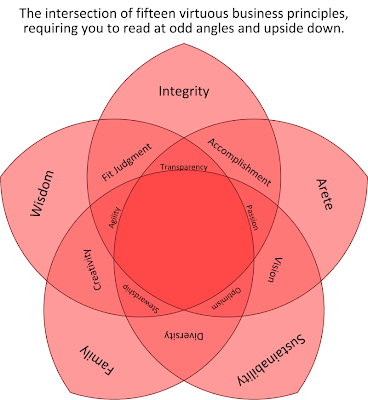To some degree, immersion in Microsoft culture has resulted in some bad habits I have when it comes to communication. I take responsibility for my own communication mien, so I don't mean to ascribe any blame to Microsoft in particular. Corporate jargon, which I generally refer to as bizspeak, extends well beyond the borders of the MSFT fiefdom. I staunchly resisted bizspeak for years. This involved careful navigation around the usage of acronyms; elaborate dancing about loaded words like critical, orthogonal, authoring; refusal to use corruptions such as irregardless
¹ and actionize (not a recognized word…yet) – I'm sure you get the picture. I’m no slouch with language, so I doubt that many “managers
²” caught on. If they did, they probably just thought I was a novice, which I was.
But after a while, it was easier by far just to talk in bizspeak than it was to speak lucidly in layman English. I could get ideas to the table more quickly, especially in meetings, and I was taken more seriously when pushing those ideas with jargon. So I embraced acronyms – sometimes to the obscure degree of using acronyms nested in acronyms (e.g. WEI = WYSIWYG Editor Interface = What You See Is What You Get Editor Interface). I adopted the careful use of buzzwords, though I refused to take useful words like conflate and discrete out of my casual speech. I am pleased to say that, except when invoking irony or contempt, I don’t use horrorwords in the vein of descope and vaca (well, mostly true: I say anonymize and mean it).
What I’m getting at is that bizspeak is practically second nature to me now. I am liable to slip into it without even knowing. I make an effort to review what I write here, but I’m not going to get myself into a lather over every lazy turn of phrase. That said, bizspeak has a tendency to drift away from clarity, sometimes butchering meaningful interpretation with obfuscation. And I can do that well enough on my own, thanks. So I will try to write in non-bizspeak English. I will not, however, attempt to omit my ten dollar words. I talk like that for reals: which is to say, like the smartest ten year old brat in the neighborhood, circa 1985, who read the dictionary for fun. For fun, I say! Stephen Fry sends me to the dictionary, so I’m not too concerned about sending you. Anyhow, if I’m not being clear about anything, feel free to call me to task.
While I’m dedicating column inches to indirectly related topics, I’ll take a moment to talk about the right column. Starts with my name, email, self-styled title, and region. I’ll change my picture when it’s significant that I do so. Below the pic is a set of four images Google is serving. That’s always going to be material that fascinates me. Usually it will be negligibly connected to the content in the main body. The mechanism is awkward anyway, making it easy to display four Émilie Simon videos but difficult for me to choose which four (
Fleur de Saison just won’t stay up!). The long list of links will get longer and, when I get around to it, broken into sensible units. The treemap Archive by date will be succeeded by an Archive by label once I figure out my taxonomy.
I’ll close with a link to a
fascinating post by Charlie Stross. This was brought to my attention by
Jonathan Korman. Jonathan will try to convince you that it is the year of the ascot, or at least very nearly so.
¹ a word that the default Microsoft Word dictionary recognizes as a misspelling of regardless but that the NOAD now lists as a legitimate, albeit informal, synonym for regardless
² blue collar : white collar :: labor : management. The scare quotes around manager are there because managers used to manage people. Nowadays, the vast majority of managers in the corporate workplace are managers in name only, managers of intangibles, of information or processes or services, managers namely because they are white collar. Managers so that they can feel – or at least position themselves as – superior to non-managers? I suspect so. Permit me a further speculation. The retreading of manager as a catch-all white collar title has stripped focus from the real and necessary skill set behind managing people, especially as it applies to managing idea-managing-managers, resulting in an overall degradation of the quality of people-managing managers in the corporate workplace.





